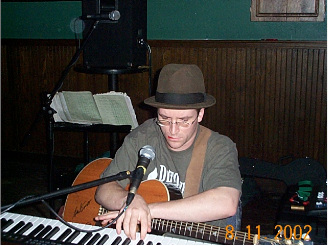The Pilot, Southern Pines, NC September 13, 2002
OK, folks, this is a music review, and it's my first time doing something like this so it might be an adventure—for you and I.
I'm approaching this as a reviewer, not a critic. A critic is versed in the history and norms of the genre they are criticizing. A critic professes to be an expert. I am not, though I did pay real good attention in my History of Rock and Roll class at UNC-Chapel Hill.
So why should you listen to me? I don't know. For some reason or another, and by virtue of being the second youngest person in the newsroom, I am presently the person with the pen, so to speak. It's a bit of an experiment, but I'm ready for it. So, here we go.
Nathan Davis is a local musician who's gained a reputation around town of being a dependable act that can bring people in. Last Friday, when Justin Fox, the 17-year-old guitar phenom from Wilmington, couldn't make a scheduled show at O'Donnell's Pub, Davis stepped right in and kept the crowd happy.

"You're right, man—this guy (meaning Fox) is good," said a friend of mine.
"Yeah, but that's not him," I replied.
It was Davis, and he was tearing it up with just a guitar and some background tracks. His excellent guitar and piano playing give him just the right sound for small town music venues like O'Donnell's and the Jefferson Inn. He is your year 2002 model of the town minstrel, easily pulling three nights with no sleep playing all the time.
On his new album, Out of My Skin, fans of his will recognize some of his most popular songs like Fool Like Me and John Coltrane and be treated to some new ones like a duet called Bridges and an instrumental version of The Star Spangled Banner.
On the album, Davis makes the title fit by exploring personal themes like loneliness, death and sin.
"I followed my thumb to be here, with a guitar in my hand, lord," he says in Streets of Anchortowne, "I found myself in the river, when I saw a broken man, lord."
There are no characters in this music, the person speaking is Davis, and that also increases the personal nature of this music. Even a song like John Coltrane, (FYI—this is the best song on the album) which many would see as a tribute, winds up being about Davis. That is perfectly fine with me, because I've always considered viewing art to be a way to know the artist.
Further, good art captures a part of the artist. That's what I like about this album. It's rough around the edges, but it's Davis as he is.
In Death of a Man, you can practically smell the beer and cigarettes of some many of the bars where Davis spends so many of his nights. That song also sports the best lyric of the album: "One thing remains true. I've got enough love for two, but only enough whiskey for one. 'Cause that's where you go, when you've got nowhere else to run."
John Coltrane is the last song on the album and it comes after several songs that really deal with sadness and death, and unless I really miss my mark here: suicide. The last couple of songs are definitely my favorites. So anyway, in Coltrane we find Davis driving down a long road on his way to or more likely away from something. In the song, the driver (clearly Davis) is feeling down and a Coltrane song comes on the radio. The driver starts to cry. But the lyric explains that they are tears of joy: "If I start to cry, just know I'm happier in life than I've ever been."
In an album where Davis asks tons of questions, the only answers he gets come from someone else's music.
